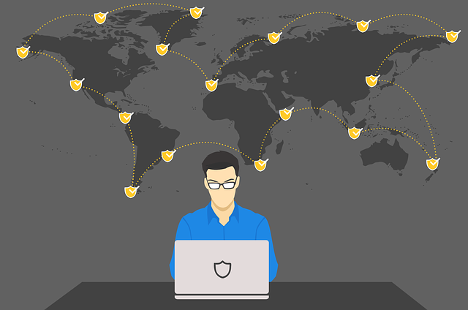Since the development of the World Wide Web in the 1990s, it has introduced new possibilities in the industry. But it has also produced new downsides of connectivity. Now tons of spam can infect email accounts and computer viruses can infect business networks.
Just like thieves, computer hackers find their way into devices for negative reasons. They ate people who break into Internet-connected devices such as smartphones, tablets, and computers. They intend to steal or delete information from your device before you are even aware of the break-in.
Here are some tips that you can follow to protect your devices and safeguard your sensitive data.
Use a Firewall
Windows and Mac operating systems usually have built-in firewall software that forms a protective barrier between the hackers and your information. Firewalls alert you to any intrusion attempts and prevent unauthorized access to your business network.
You need to make sure that the firewall software is working before you start any online activity. If you run a big company, you can even purchase an additional business networking firewall.
Install Antivirus Software
Since most businesses rely on the internet to track finances, conduct marketing, manage inventory and connect with customers, it’s crucial to use antivirus programs and the fastest VPN you can get so that your online activities can be kept confidential.
Such software also plays a major role in protecting your system by detecting real-time threats to ensure that your data is safe. Many antivirus programs now provide automatic updates to protect your devices from viruses.
Use Strong Passwords
Using complex and secure passwords is one of the most important ways to prevent intrusion by hackers. Secure passwords should be longer, have at least eight characters, and be a combination of uppercase letters, lowercase letters, and computer symbols.
Avoid using recognizable combinations that represent information that is closely related to you like your birthday, pet’s name, etc.
Ignore Spam Messages
You need to be aware of email messages from unknown parties. You should never open unknown links. Inbox spam filters are quite good at catching the most conspicuous spam.
Keep your eyes open to anything that looks suspicious since sophisticated phishing emails have become quite common and many more people know how to use them.
Backup Your Device
If you haven’t started backing up your important data, you should start doing it now. In case a malicious group[ gets access to your information and steals it for ransom, you’ll lose your data entirely and will need to pay the ransom to get it back.
Backing up messages will ensure that you rebuild as quickly as possible after suffering data loss. You can add an external backup hard drive to run your business properly.
Use Two-Factor Authentication
Even though solid passwords are somewhat effective against computer hackers, it’s necessary to have a second layer of protection or multiple layers of encryption in extreme cases.
There are many sites that allow two-factor authentication which can boost security since you have to type in the numerical code in addition to the password.



